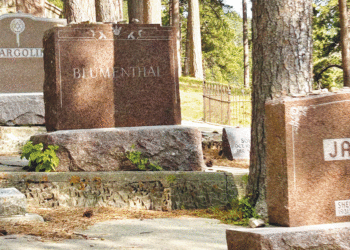“Spread over us the sukka of Your peace.” — From the Evening Service
It’s hard to publish a Jewish newspaper during the month of Tishrei, with all of the office closings for holidays. But enough kvetching. We are coming up on Sukkot, Zman Simchateinu, the Season of Our Rejoicing, so we should be uplifted.
Jews rejoice in the sukka, a temporary structure with a thatched roof, recalling the tents that our ancestors dwelled in during their wanderings in the wilderness. The sukka also evokes the transitory nature of our existence. We, a famously wandering people, are always busy creating sturdy homes and other monuments to an illusory permanence. Actually, we are on this planet for a very short time, in the cosmic scheme of things.
Some of the Sukkot rituals have always reminded me of rituals I have witnessed in my visits to American Indian lands across North America. Davening with the lulav (fronds) and etrog (citron) involves bowing to the four directions and to the sky and earth, as the Indians do in some rituals. There is even a prayer for rain on Shemini Atzeret, the eighth day of the festival.
A rabbinical student, Rachel Barenblat, writes in a wonderful blog, the Velveteen Rabbi, about Sukkot, and other aspects of Judaism. Regarding the coming holiday, she writes about spending the day in her sukka, davening:
During evening prayer there’s an extra blessing added — extra because it doesn’t appear in morning or afternoon prayer — which asks God to shelter us through the coming night. We pray… ufros aleinu sukkat shlomecha, ‘spread over us the sukkah of Your peace.’
Of course, a sukkah is by definition permeable. The safety and comfort we seek as night begins isn’t the comfort of armored gates and locked-down windows. This is a peace that’s open to the changing sky, and to the sounds of crickets and cicadas playing their end-of-summer tune. A peace that knows the heady scent of new-mown grass, and the spiciness of woodsmoke.
The word shalom comes from a root which means wholeness, completeness. What we’re asking for in this prayer is to be made whole, to find our whole selves sheltered by the Infinite. This shelter is real, but it’s permeable. Our wholeness is possible only when we embrace fragility. It’s a paradox: protection comes when we embrace humility, not strength. The way to be safe is to open our hearts.
We are living in fraught times in the United States, trying to navigate the steep economic downturn, two foreign wars and a political climate that is tilting towards incivility. On the political right, the drumbeat has been about demonizing immigrants and Muslims. In the weeks before the civic commemorations of the Sept. 11 terrorist attacks, we have witnessed clamor in the press and blogosphere about the so-called Ground Zero mosque. In one of the incredible events that happen only in America, Terry Jones, a preacher with a tiny flock and an animus against Islam, threatened to burn copies of the Koran, the Muslim holy book, and he became notorious around the world. His stunt sparked riots in Afghanistan and Indonesia; several people were killed.
Jews from different groups and streams have organized to combat the anti-Muslim bigotry roiling our society (see story on Page 5). And I was gratified by the words of both President Obama and Rep. Keith Ellison affirming that our nation is based on religious freedom and tolerance. Ellison (who was endorsed by the American Jewish World when he first ran for the U.S. House in 2006) spoke at a Sept. 11 vigil near the site of the proposed Islamic community center, which is two blocks from Ground Zero.
Addressing around 1,500 supporters of the project known as Park51, Ellison said, according to the Star Tribune: “The whole world is watching you. You emphatically say we are together, and we can’t be torn apart based on religion.”
As the first Muslim ever elected to Congress, Ellison generally has refrained from putting himself forward as a spokesman for his religious community. In what the newspaper noted was something of a departure, Ellison was a keynote speaker at the vigil of supporters of the proposed New York City mosque.
“This series of events has given me a new shot and a renewed commitment to make sure America’s doors stay open, and we won’t ever say we have somebody we want to throw under the bus,” Ellison told the Star Tribune. “Not the Japanese, not the Catholics, not the Jews, and now not the Muslims. We’re not going to do that. We’re going to stay a country that prizes its diversity.”
In Sukkot, we welcome the stranger into our sukka, which is open to the elements and cannot survive a strong wind. In this holiday, and in the coming year, I hope that we can dare to be more openhearted as we confront daunting social problems. We have been the strangers in a strange land, in various times and places. We should remember that Jews have been the victims of oppression, and that it is a betrayal of our history and our prophetic tradition to oppress others.
G’mar Chatima Tova! Chag Sukkot Sameach!
— Mordecai Specktor / editor@ajwnews.com
(American Jewish World, 9.17.10)



















